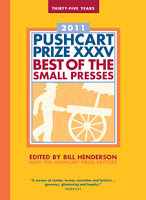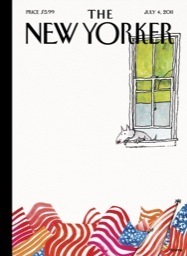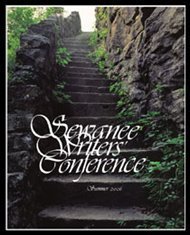Clifford Garstang's Blog, page 128
June 28, 2011
Pushcart Prize Rankings Links Now in Sidebar
 No, there's no news yet about the latest Pushcart Prizes. I won't know that until the new volume comes out in November. But for fans of my annual Pushcart Prize Rankings, I wanted to point out that I've now put links the past 4 years of rankings in the sidebar at upper right here on the blog for handy reference.
No, there's no news yet about the latest Pushcart Prizes. I won't know that until the new volume comes out in November. But for fans of my annual Pushcart Prize Rankings, I wanted to point out that I've now put links the past 4 years of rankings in the sidebar at upper right here on the blog for handy reference.When the rankings for 2012 are announced later this year, I'll create a separate page for the list. No need for separate bookmarks or tedious Google searches!
Published on June 28, 2011 07:58
Work in Progress
 I've been working on a novel for some time now. It's been done and then un-done, but it will be done again soon. I'm doing yet another round of revisions (today I begin on page 54 of 350) having already addressed in the first 50 pages the concerns expressed by a couple of readers. The task now is to see how the changes I've made will ripple through the manuscript (without, I hope, becoming a tsunami).
I've been working on a novel for some time now. It's been done and then un-done, but it will be done again soon. I'm doing yet another round of revisions (today I begin on page 54 of 350) having already addressed in the first 50 pages the concerns expressed by a couple of readers. The task now is to see how the changes I've made will ripple through the manuscript (without, I hope, becoming a tsunami).I think the book has, potentially, broad appeal. The main character is a man, but most of the other characters are women: his mother, his estranged wife, his cousin, his ex-girlfriend. It's set in Virginia, but also explores a more "exotic" setting. It's contemporary, but has historic ties.
I wish I could say more. The picture at left is a hint . . .
And now, I'm going to dive back in. See you later.
Published on June 28, 2011 05:09
June 27, 2011
The New Yorker: "Homage to Hemingway" by Julian Barnes
 July 4, 2011: "Homage to Hemingway" by Julian Barnes
July 4, 2011: "Homage to Hemingway" by Julian BarnesThis story needs more attention than I'm going to be able to give it here, but on my cursory look it's a very good story—especially if the reader also happens to be a writer.
The story is divided into three parts, in each of which a novelist is teaching a writing course. First he's in the countryside in England with adult students. Next he's in the Alps in mid-Summer. And last he's in the US, in the Midwest, teaching undergraduates. Over the time covered by the story and the three parts, he separates and then is divorced from his wife; a book has come out and not done well; and his most recent manuscript has yet to find a publisher.
Things don't go so well in his writing classes, either, but he begins to refine his schtick. He likes to talk about Hemingway, although in this case he actually likes to talk about a Hemingway lookalike, but that invariably leads to talking about the writer himself. And the story he chooses to talk about is an unusual one for Hemingway: "Homage to Switzerland." Here is Barnes reading that story: Homage to Switzerland. (It's no coincidence that this Barnes story has a three-part structure.) The narrator finds that men and women in his classes react rather differently to Hemingway, and he explains to his students that his own assessment has evolved into admiration, making the point that so many readers have missed what Hemingway was doing, that it's really all about vulnerability and failure and not just about machismo.
In the end, with plans to write an "American novel" that he assumes he won't be able to publish because it isn't what readers want anymore, he takes notes on the class he's teaching, including the different reactions of the genders to Hemingway.
It's interesting that the class would fall apart over the issue of names. The female students don't like the fact that the females in the Hemingway story are unnamed. The narrator asks if they'd be happier if the male narrator were unnamed and the females all given names. They say yes, and so he's done that. In each part of the story, his name is left out. The students call him Chief, or Professor, or in the final section, Maestro. But the students are named. Although I like this bit of self-referential structure, I think I would have liked it better if the narrator had helped the students discover a rationale for why the names had been left out. (I usually assume that the author is aiming for universality.)
It's a good story, worthy of rereading, and perhaps one of the best of the year.
Published on June 27, 2011 17:43
June 26, 2011
Gardening 2011 -- June update
I'm a lousy gardener. Lousy and lazy. Gardens need attention and I'm just not that into it!
I'm not sure any of that's true, but it is a big job, especially when you have a big garden, as I do. (This is probably the root of the problem.) Anyway, I've got some very nice looking plats: corn, eggplant, peppers, herbs, pumpkin, squash, acorn squash, zucchini, cucumber, okra, beans, crook-neck squash, melons, sunflowers, and, maybe, broccoli (maybe because they're still so small that it's hard to tell what they are.) And I've got lots of weeds. And now I've got some stink bugs (discovered today when I was doing battle with the weeds). I've been expecting them, but I don't know what to do about them. Hope they'll go away? Yeah, that sounds like a good strategy.
Pictures:
 cucumber
cucumber
 Japanese eggplant
Japanese eggplant
 green pepper
green pepper
 red okra
red okra
 big beefy
big beefy
 sunflower
sunflower
 zucchini
zucchini
 corn
corn
I'm not sure any of that's true, but it is a big job, especially when you have a big garden, as I do. (This is probably the root of the problem.) Anyway, I've got some very nice looking plats: corn, eggplant, peppers, herbs, pumpkin, squash, acorn squash, zucchini, cucumber, okra, beans, crook-neck squash, melons, sunflowers, and, maybe, broccoli (maybe because they're still so small that it's hard to tell what they are.) And I've got lots of weeds. And now I've got some stink bugs (discovered today when I was doing battle with the weeds). I've been expecting them, but I don't know what to do about them. Hope they'll go away? Yeah, that sounds like a good strategy.
Pictures:
 cucumber
cucumber Japanese eggplant
Japanese eggplant green pepper
green pepper red okra
red okra big beefy
big beefy sunflower
sunflower zucchini
zucchini corn
corn
Published on June 26, 2011 13:47
June 21, 2011
Sewanee Writers' Conference: Scholars and Fellows
 Last year at this time, I was excitedly preparing for the Sewanee Writers' Conference, for which I was a 2010 Walter E. Dakin Fellow. It's such a wonderful conference and it was an honor to be named a fellow. I wish I could go again!
Last year at this time, I was excitedly preparing for the Sewanee Writers' Conference, for which I was a 2010 Walter E. Dakin Fellow. It's such a wonderful conference and it was an honor to be named a fellow. I wish I could go again!Congratulations to this year's fellows and scholars!
Published on June 21, 2011 08:41
Happy Solstice!
 Today, in the Northern Hemisphere, is the Summer Solstice. For me the significance is mostly that now, finally, the days will begin to shorten; the return to the delicious weather of Autumn has begun. Not to mention the countdown to football season.
Today, in the Northern Hemisphere, is the Summer Solstice. For me the significance is mostly that now, finally, the days will begin to shorten; the return to the delicious weather of Autumn has begun. Not to mention the countdown to football season.
Published on June 21, 2011 04:31
June 20, 2011
The New Yorker: "Gravel" by Alice Munro

June 27, 2011: "Gravel" by Alice Munro
But what happened to Blitzee?
As I was reading this wonderful Alice Munro story (available for free, so read it quick before they change their minds!), I wondered why the narrator had such a poor memory of this period of her life. She was five, true, but still. And then the facts are revealed. How her holder Caro sister had acted out already—a protest, in a sense, over the destruction of the family—and so Caro's behavior on the day in question was not a huge surprise.
The girls' mother fancies herself a Bohemian, hangs out with actors at the local summer theater, and eventually leaves their father for Neal, who, she says, has made her pregnant. Even though it's the mother who has caused the problem, she retains custody and takes the girls to a trailer to live with Neal. It's out in the country and has various dangers, but the mother isn't a very attentive caretaker. Which is not to say she doesn't love the girls. She does, and she watches out for them. Until one day . . .
But what happened exactly. She doesn't remember. I don't blame her.
A very good story.
Published on June 20, 2011 15:52
June 18, 2011
Tinker Mountain Writers' Workshop 2011
 I haven't posted lately because I've been at a workshop: the Tinker Mountain Writers' Workshop at Hollins University. I wasn't planning to do a workshop this summer, but I've been working on a novel and felt that I needed an extra push to get the revisions done. And Fred Leebron
I haven't posted lately because I've been at a workshop: the Tinker Mountain Writers' Workshop at Hollins University. I wasn't planning to do a workshop this summer, but I've been working on a novel and felt that I needed an extra push to get the revisions done. And Fred Leebron was teaching at the workshop, and I've missed a few other opportunities to work with him. So, it was something of a last minute decision--but I'm very glad I went.
was teaching at the workshop, and I've missed a few other opportunities to work with him. So, it was something of a last minute decision--but I'm very glad I went.The setting--Hollins University just outside of Roanoke, Virginia--isn't the most beautiful spot in the world (i.e., it's not a mountain top in Tennessee or Vermont), but it's a pleasant campus, and convenient. This year's conference had just four workshops--a few others that had been planned were cancelled--so it was intimate. But our workshop on the Advanced Novel was big--12 writers--which meant it was a lot of work (which isn't a bad thing at a workshop). Fred is a great teacher, and every session of the workshop included craft discussion in addition to the manuscript critique, which I think is ideal. I learned a ton, and am excited to get back to work on the book.
The other workshops were with Dan Mueller
 , Jim McKean
, Jim McKean , and Nick Lantz
, and Nick Lantz .
.
Published on June 18, 2011 06:30
June 12, 2011
Prime Number Magazine -- update 7.5 is now live
 I'm pleased to announce that the latest update to Prime Number Magazine is now available. Please visit Prime Decimal 7.5 to read new work by Randall Brown, Christin Rice, Joe Mills, Jenn Blair, Jéanpaul Ferro, and William Reichard.
I'm pleased to announce that the latest update to Prime Number Magazine is now available. Please visit Prime Decimal 7.5 to read new work by Randall Brown, Christin Rice, Joe Mills, Jenn Blair, Jéanpaul Ferro, and William Reichard.And, bear in mind that we are reading for future issues of the magazine, and would love to have a chance to consider your work.
Published on June 12, 2011 05:14
June 11, 2011
Restless Ecstasy Tour: The American Shakespeare Center
 I've had kind of a busy Spring, so I only last night saw the third of the three shows that are currently in repertory at the American Shakespeare Center's Blackfriars Playhouse in Staunton. I highly recommend all three--but you better hurry. There's only one week left in the season.
I've had kind of a busy Spring, so I only last night saw the third of the three shows that are currently in repertory at the American Shakespeare Center's Blackfriars Playhouse in Staunton. I highly recommend all three--but you better hurry. There's only one week left in the season.The Spring Season is the time when the touring company comes off the road and entertains us at the Blackfriars while the resident company is working up the new shows for Summer and Fall Seasons. The "Restless Ecstasy" Tour (the name comes from a line in Macbeth: "Better be with the dead, whom we, to gain our peace, have sent to peace, than on the torture of the mind to lie in restless ecstasy") is made up of several tour veterans as well as a few newcomers and is one of the strongest ASC touring companies in memory.
I'll start with the show I saw last night--Macbeth. The production is outstanding, and probably the best Macbeth I've seen at the Blackfriars. This is due in no small part to the strength of Jonathan Holtzman and Denice Burbach as Macbeth and Lady Macbeth. Their chemistry was powerful, and Holtzman's commanding presence on the stage was electric. And everyone remembers the Weird Sisters from a Macbeth production, and Natasha Solomon, Brandi Rhome, and Kelley McKinnon (with Daniel Jimenez as Hecate) were terrific. Chad Bradford as Macduff was also excellent.
Last week I saw Measure for Measure, which is one of my favorite of Shakespeare's comedies, possibly because the characters in disguise are kept to a minimum--we only have to deal with Vencentio, the Duke, in his disguise as a friar. But in that part, Chad Bradford was quite good. In Vincentio's "absence," the city is governed by Angelo, played by Jake Mahler, who does a fine job as the rigid moralist who is stricken with love for Isabella, played nicely by Brandi Rhome, as she pleads for the life of her brother Claudio who has been sentenced to death.
The first show I saw this season was As You Like It, which I confess is maybe my least favorite of the comedies. But the company did a wonderful job with it. Denice Burbach is Rosalind, who falls in love with Orlando, played by Chad Bradford. But Orlando gets himself banished and so does Rosalind (in disguise as a boy), and they both end up in the Forest of Arden, where Rosalind's banished father (Jonathan Holtzman) lives.
It was a great season, and I look forward to the touring company's return next year. In the meantime, the resident company kicks off their new season with the Tempest and The Importance of Being Earnest (Oscar Wilde) later this month, adding Hamlet in July.
Published on June 11, 2011 06:44



